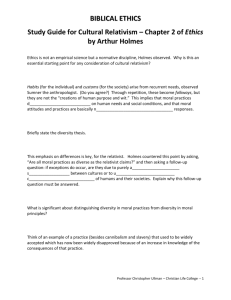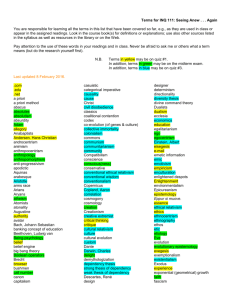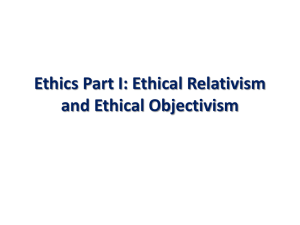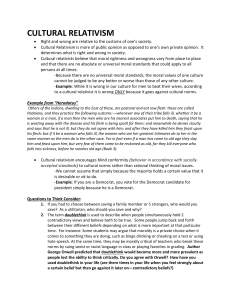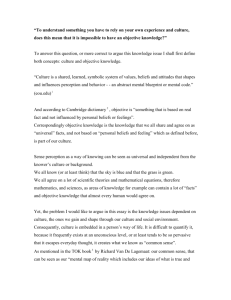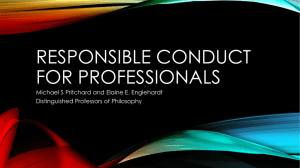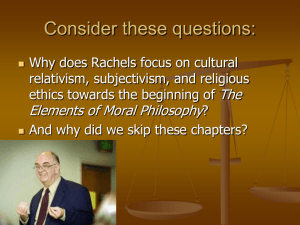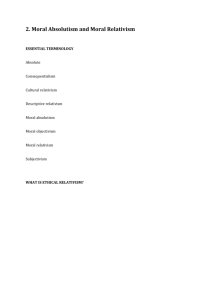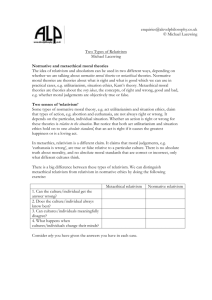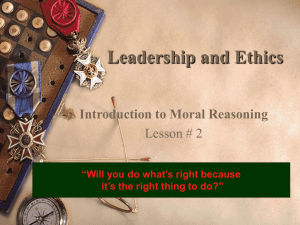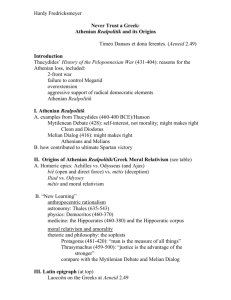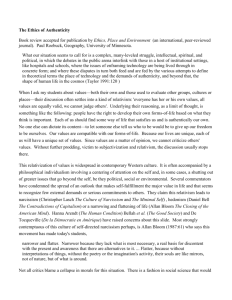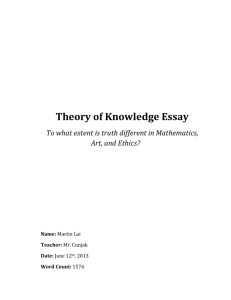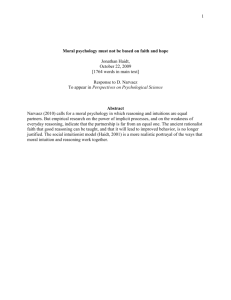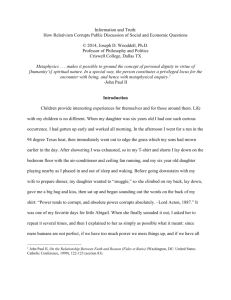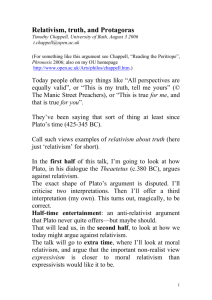IB TOK Objectives
advertisement
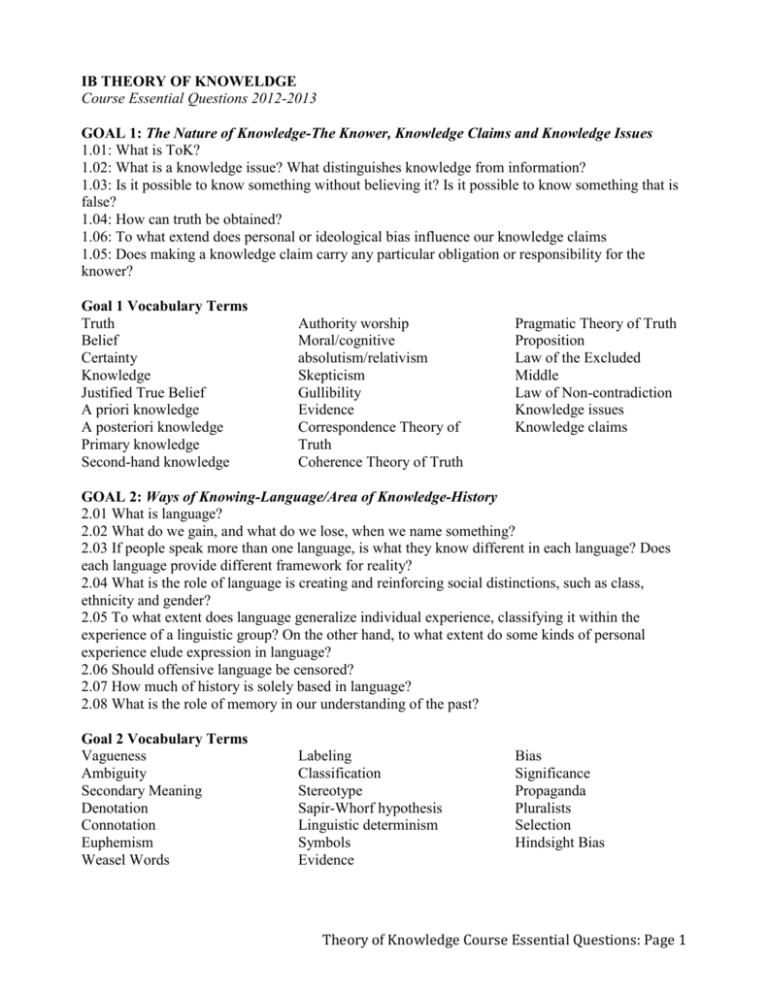
IB THEORY OF KNOWELDGE Course Essential Questions 2012-2013 GOAL 1: The Nature of Knowledge-The Knower, Knowledge Claims and Knowledge Issues 1.01: What is ToK? 1.02: What is a knowledge issue? What distinguishes knowledge from information? 1.03: Is it possible to know something without believing it? Is it possible to know something that is false? 1.04: How can truth be obtained? 1.06: To what extend does personal or ideological bias influence our knowledge claims 1.05: Does making a knowledge claim carry any particular obligation or responsibility for the knower? Goal 1 Vocabulary Terms Truth Belief Certainty Knowledge Justified True Belief A priori knowledge A posteriori knowledge Primary knowledge Second-hand knowledge Authority worship Moral/cognitive absolutism/relativism Skepticism Gullibility Evidence Correspondence Theory of Truth Coherence Theory of Truth Pragmatic Theory of Truth Proposition Law of the Excluded Middle Law of Non-contradiction Knowledge issues Knowledge claims GOAL 2: Ways of Knowing-Language/Area of Knowledge-History 2.01 What is language? 2.02 What do we gain, and what do we lose, when we name something? 2.03 If people speak more than one language, is what they know different in each language? Does each language provide different framework for reality? 2.04 What is the role of language is creating and reinforcing social distinctions, such as class, ethnicity and gender? 2.05 To what extent does language generalize individual experience, classifying it within the experience of a linguistic group? On the other hand, to what extent do some kinds of personal experience elude expression in language? 2.06 Should offensive language be censored? 2.07 How much of history is solely based in language? 2.08 What is the role of memory in our understanding of the past? Goal 2 Vocabulary Terms Vagueness Ambiguity Secondary Meaning Denotation Connotation Euphemism Weasel Words Labeling Classification Stereotype Sapir-Whorf hypothesis Linguistic determinism Symbols Evidence Bias Significance Propaganda Pluralists Selection Hindsight Bias Theory of Knowledge Course Essential Questions: Page 1 GOAL 3: Ways of Knowing-Sense Perception/Area of Knowledge-Natural Sciences & Human Sciences 3.01 To what extent do our 5 senses actively structure reality around us? 3.02 How do our senses deceive our understanding of the reality around us? 3.03 How do we use our sense perception in the scientific method? 3.04 How do we distinguish what is a “real” science and what is a “pseudo science”? 3.05 To what extent should we buy into the philosophy that “seeing is believing”? 3.06 What about natural sciences and human sciences make them more easily believed than other areas of knowledge? Goal 3 Vocabulary Terms Common Sense Realism Empiricism Figure and Ground Phenomenalism Scientific Realism Sensation Visual Agnosia Visual Grouping Anomaly Conjectures and refutations Controlled Experiments Falsification Paradigm Principle of Simplicity Pseudo-Science Rationalist Relativism Science Worship Reductionism Reductive Fallacy Holism Verstehen Position Trends and Laws GOAL 4: Ways of Knowing-Emotion/Area of Knowledge-Visual Arts and Literature 4.01 To what extent can we control our emotions? Which is emotion is most difficult to control? How might this explain emotion as an essential way of knowing? 4.02 What are the roles of beliefs in shaping our emotions and our emotional reactions to different scenarios? 4.03 Are emotions always rational? If not, how do we define an “irrational” fear? 4.04 To what extent are the arts a way of experiencing rather than a way of knowing? 4.05 How do we classify art from non-art? Goal 4 Vocabulary Terms Primary Emotions James-Lange Theory Empathize Social Emotions Emotional Energy Emotional Coloring Biased Perception Fallacious Reasoning Emotive Language Apathy (the Stoics) Intuition Debugging intuition Romanticism Way of Experiencing Imagination Art vs. Non-Art Value Judgment GOAL 5: Ways of Knowing-Reason &Logic/Area of Knowledge-Mathematics 5.01According to rationalism, reason is a more important source of knowledge than experience. Is this correct? 5.02Analyze the following claim: “All generalizations are false—including this one.” 5.03 To what extent can inductive logic lead to a lack of knowledge? 5.04 Are all fallacies bad? 5.05Which is easier: having the courage of your convictions, or having the courage to question your convictions? 5.06To what extent is mathematics a practice in absolute truths? 5.07 To what extent is mathematics a discipline of discovery or a discipline of creativity Theory of Knowledge Course Essential Questions: Page 2 Goal 5 Vocabulary Terms Premises Rationalism Fallacies Syllogism Truth Validity Belief Bias Venn Diagram Deductive Reasoning Enthymeme Induction Confirmation Bias Post hoc ergo propter hoc Ad hominem Vested Interest Circular Reasoning Special Pleading Equivocation Ad Ignorantiam False Analogy False dilemma Loaded Questions Laws of Thought Prison of Consistency Lateral Thinking Infinite Regress Goldbach’s Conjecture a priori a posteriori Empirical Idealization GOAL 6: Areas of Knowledge: Ethics, Faith and Religion 6.01 How to we justify our moral reasoning? 6.02 To what extent are ethics and moral created by the society that shapes us? 6.03 How do the different theories in ethical reasoning demonstrate the various ways of knowing? 6.04 What is the purpose of religion? To what extent does it serve this purpose? 6.05 While the various religions include contradictions to one another, do they point to some underlying truth? 6.06 How do our religious beliefs define and shape personally and in society? Goal 6 Vocabulary Terms Altruism Cultural imperialism Duty ethics Egoism Golden Rule Moral Absolutism Moral Principle Moral Relativism Other-Regarding Desires Relativism Rights Rule Worship Self-Interest Theory Self-Regarding Desires Special Pleading Utilitarianism Value-Judgment Veil of Ignorance Agnosticism Anthropomorphism Argument from Design Atheism Core Intuition Cosmological Argument Free Will Defense God of the philosophers Leap of Faith Logical Positivism Metaphysics Omnaiamorous Omnipotent Pantheism Paradox of Omnipotence Pascal’s Wager Problem of Suffering Theism Wish Fulfillment GOAL 7: Paper and Presentation Review GOAL 8: HOTA Review-Paper III Topics Theory of Knowledge Course Essential Questions: Page 3 Long Term Plan:2012-2013 IB Theory of Knowledge Course Overview and Timing Unit Unit Length Unit Dates Unit 1: The Nature of Knowledge-The Knower, Knowledge Claims and Knowledge Issues 10 days September 5-October 1st Unit 2: Ways of Knowing-Language/Area of Knowledge-History 8 days October 3rd-October 24th Unit 3: Ways of Knowing-Sense Perception/Area of Knowledge-Natural Sciences & Human Sciences 9 days October 25th-November 27th Unit 4: Ways of Knowing-Emotion/Area of Knowledge-Visual Arts and Literature 7 days November 28th-December 17th Unit 5: Ways of Knowing-Reason &Logic/Area of Knowledge-Mathematics 7 days January 2nd-Februrary 1st* Unit 6: Areas of Knowledge: Ethics, Faith and Religion 6 days February 4th-February 20th Unit 7: Paper and Presentation Review 13 days February 21st-March 28th Unit 8: HOTA Review-Paper III Topics 9 days April 8th-May 1st Important Dates to Note Holidays 9/3: Labor Day; 11/12 Veterans Day; 11/21-23 Thanksgiving Break; 12/21-1/1 Winter Break; 1/21 MLK Jr.; 2/18 President’s Day; 4/1-4/5 Spring Break; 5/27 Memorial Day Teacher Workdays 10/29, 11/6, 1/22, 3/29 Dates of Significance 12/20/2012-Extended Essay Due 2/25, 2/26-TOK EA Uploaded 3/11-3/28-TOK Presentations December 18-20 We will work on EE Revisions *Semester Exams in the middle of Unit 5—Have presentation practice Theory of Knowledge Course Essential Questions: Page 4 Theory of Knowledge Course Essential Questions: Page 5

